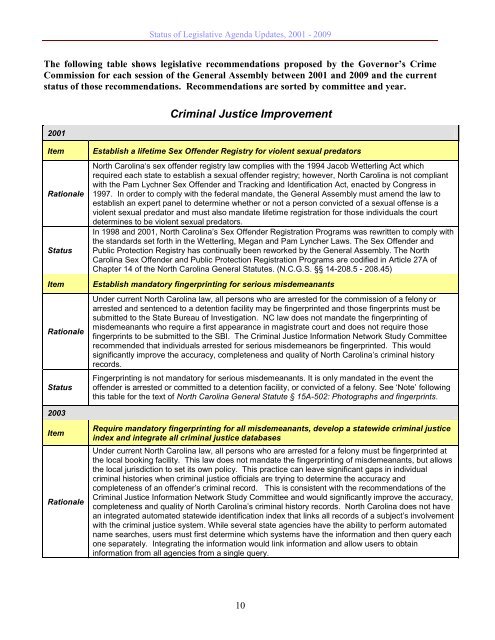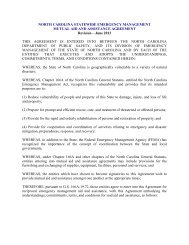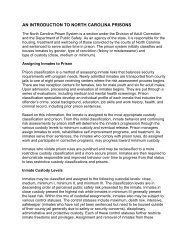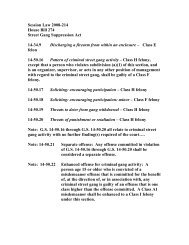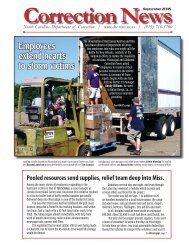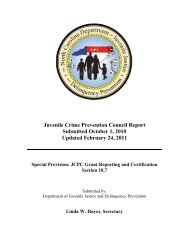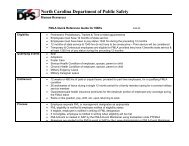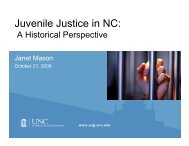GCC 2011 Legislative and Policy Agenda - North Carolina ...
GCC 2011 Legislative and Policy Agenda - North Carolina ...
GCC 2011 Legislative and Policy Agenda - North Carolina ...
- No tags were found...
You also want an ePaper? Increase the reach of your titles
YUMPU automatically turns print PDFs into web optimized ePapers that Google loves.
Status of <strong>Legislative</strong> <strong>Agenda</strong> Updates, 2001 - 2009The following table shows legislative recommendations proposed by the Governor’s CrimeCommission for each session of the General Assembly between 2001 <strong>and</strong> 2009 <strong>and</strong> the currentstatus of those recommendations. Recommendations are sorted by committee <strong>and</strong> year.2001Criminal Justice ImprovementItemRationaleStatusItemRationaleStatusEstablish a lifetime Sex Offender Registry for violent sexual predators<strong>North</strong> <strong>Carolina</strong>„s sex offender registry law complies with the 1994 Jacob Wetterling Act whichrequired each state to establish a sexual offender registry; however, <strong>North</strong> <strong>Carolina</strong> is not compliantwith the Pam Lychner Sex Offender <strong>and</strong> Tracking <strong>and</strong> Identification Act, enacted by Congress in1997. In order to comply with the federal m<strong>and</strong>ate, the General Assembly must amend the law toestablish an expert panel to determine whether or not a person convicted of a sexual offense is aviolent sexual predator <strong>and</strong> must also m<strong>and</strong>ate lifetime registration for those individuals the courtdetermines to be violent sexual predators.In 1998 <strong>and</strong> 2001, <strong>North</strong> <strong>Carolina</strong>‟s Sex Offender Registration Programs was rewritten to comply withthe st<strong>and</strong>ards set forth in the Wetterling, Megan <strong>and</strong> Pam Lyncher Laws. The Sex Offender <strong>and</strong>Public Protection Registry has continually been reworked by the General Assembly. The <strong>North</strong><strong>Carolina</strong> Sex Offender <strong>and</strong> Public Protection Registration Programs are codified in Article 27A ofChapter 14 of the <strong>North</strong> <strong>Carolina</strong> General Statutes. (N.C.G.S. §§ 14-208.5 - 208.45)Establish m<strong>and</strong>atory fingerprinting for serious misdemeanantsUnder current <strong>North</strong> <strong>Carolina</strong> law, all persons who are arrested for the commission of a felony orarrested <strong>and</strong> sentenced to a detention facility may be fingerprinted <strong>and</strong> those fingerprints must besubmitted to the State Bureau of Investigation. NC law does not m<strong>and</strong>ate the fingerprinting ofmisdemeanants who require a first appearance in magistrate court <strong>and</strong> does not require thosefingerprints to be submitted to the SBI. The Criminal Justice Information Network Study Committeerecommended that individuals arrested for serious misdemeanors be fingerprinted. This wouldsignificantly improve the accuracy, completeness <strong>and</strong> quality of <strong>North</strong> <strong>Carolina</strong>‟s criminal historyrecords.Fingerprinting is not m<strong>and</strong>atory for serious misdemeanants. It is only m<strong>and</strong>ated in the event theoffender is arrested or committed to a detention facility, or convicted of a felony. See „Note‟ followingthis table for the text of <strong>North</strong> <strong>Carolina</strong> General Statute § 15A-502: Photographs <strong>and</strong> fingerprints.2003ItemRationaleRequire m<strong>and</strong>atory fingerprinting for all misdemeanants, develop a statewide criminal justiceindex <strong>and</strong> integrate all criminal justice databasesUnder current <strong>North</strong> <strong>Carolina</strong> law, all persons who are arrested for a felony must be fingerprinted atthe local booking facility. This law does not m<strong>and</strong>ate the fingerprinting of misdemeanants, but allowsthe local jurisdiction to set its own policy. This practice can leave significant gaps in individualcriminal histories when criminal justice officials are trying to determine the accuracy <strong>and</strong>completeness of an offender‟s criminal record. This is consistent with the recommendations of theCriminal Justice Information Network Study Committee <strong>and</strong> would significantly improve the accuracy,completeness <strong>and</strong> quality of <strong>North</strong> <strong>Carolina</strong>‟s criminal history records. <strong>North</strong> <strong>Carolina</strong> does not havean integrated automated statewide identification index that links all records of a subject‟s involvementwith the criminal justice system. While several state agencies have the ability to perform automatedname searches, users must first determine which systems have the information <strong>and</strong> then query eachone separately. Integrating the information would link information <strong>and</strong> allow users to obtaininformation from all agencies from a single query.10


